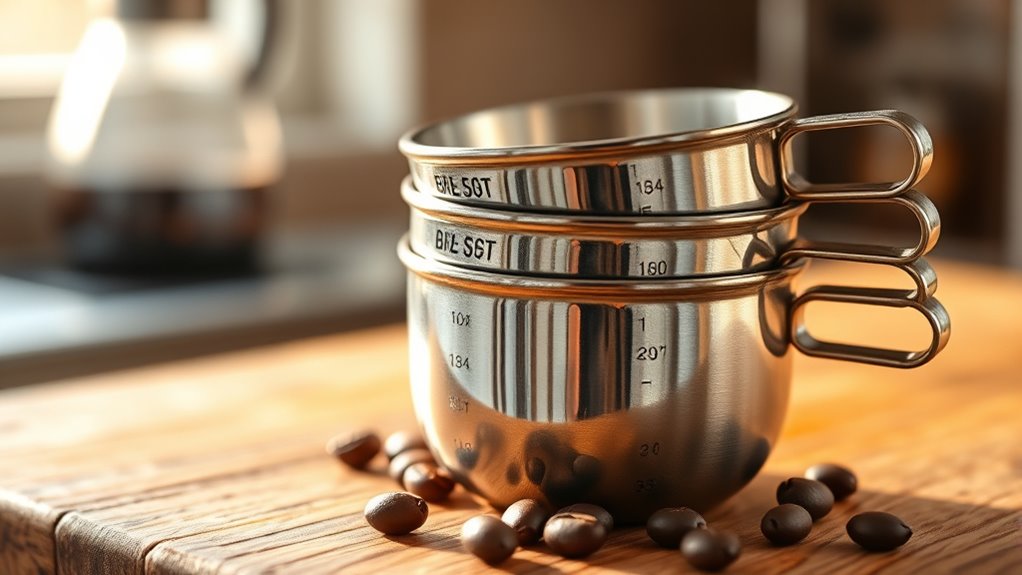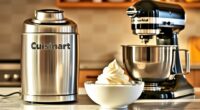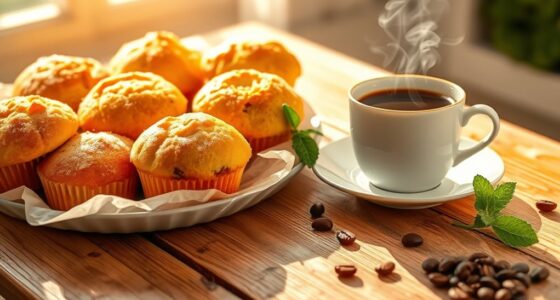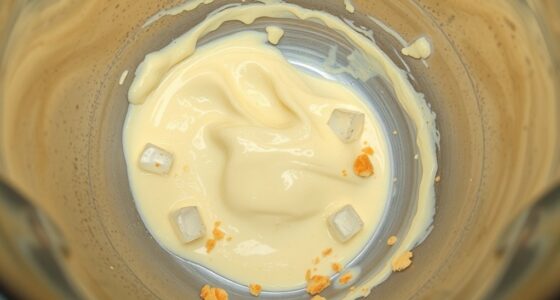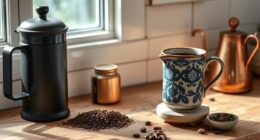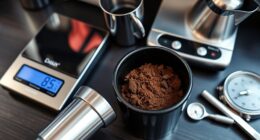To get your coffee just right, choose a liquid measuring cup with clear, easy-to-read markings and an ergonomic handle for accurate pouring. Use glass or stainless steel options for durability and precision, and consider features like angled measurement marks or collapsible designs for added convenience. Proper measurement helps guarantee consistent flavor and strength each time. Keep exploring to discover tips that will elevate your coffee brewing experience even further.
Key Takeaways
- Use clear, easy-to-read liquid measuring cups for precise water and concentrate measurements.
- Choose durable materials like glass or stainless steel to ensure longevity and resistance to stains.
- Opt for cups with angled or clear markings to improve visibility at eye level.
- Select appropriate sizes and features such as collapsible or stackable designs for convenience and space-saving.
- Always measure coffee grounds and water accurately to achieve consistent flavor and brewing results.
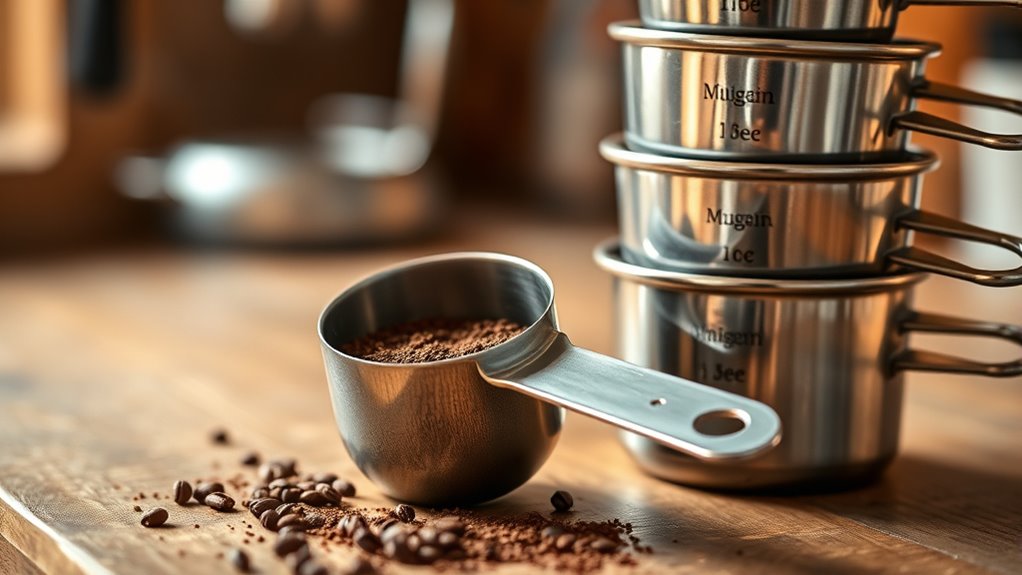
A good cup of coffee starts with accurate measurements, and choosing the right coffee measuring cup is essential for brewing consistency. When you’re aiming for that perfect brew, precision matters—whether you’re measuring coffee grounds or water. Measuring cups come in two main categories: dry and liquid. For coffee, liquid measuring cups are often preferred because they allow you to read water or coffee concentrate levels easily. These cups typically feature clear, easy-to-read markings that help you measure accurately, which is vital for maintaining consistent flavor and strength in your coffee.
Materials play a significant role in choosing your measuring cup. Glass is an excellent option because of its clarity and durability; you can see the liquid level clearly, and it’s resistant to odors and stains. Stainless steel is sturdy and resistant to scratches, making it a good choice for dry ingredients, though it’s less common for liquids. Plastic is versatile and lightweight but can stain or warp over time. Silicone, often used in collapsible cups, offers flexibility and space-saving benefits, especially if you have limited storage. Aluminum isn’t typically recommended because it can bend or dent easily.
Materials like glass, stainless steel, plastic, and silicone each offer unique benefits for coffee measuring cups.
When selecting a measuring cup, features matter. Clear markings are essential—they prevent guesswork and make sure you add the right amount of water or coffee grounds. Some cups are designed with angled features, making it easier to read measurements at eye level without bending over. Adjustable or collapsible cups add convenience, especially if you need to measure sticky ingredients like syrups or want to save space in your kitchen. Ergonomic handles or silicone grips improve handling, reducing the chance of spills and making precise measurement easier.
Your purpose influences the type of cup you need. If you mainly measure coffee grounds, a sturdy dry measuring cup might suffice. For liquids, a transparent, accurate liquid measuring cup is your best bet. Consider the material’s durability—look for cups resistant to scratches and stains, guaranteeing longevity. Ease of handling is also vital; cups with comfortable grips or ergonomic designs make the process smoother.
Storage options are another consideration. Stackable sets save space, especially if you have limited kitchen real estate. Collapsible cups are excellent for small kitchens, folding down when not in use. Drawer organizers or hooks can keep your measuring cups tidy and accessible, preventing clutter. Some brands, like Door County Coffee, offer specialized liquid measuring cups designed specifically for coffee recipes, combining accuracy with convenience.
In addition, understanding the importance of contrast ratio in projectors can help you appreciate how it affects the visual quality of your home cinema setup. In the end, choosing the right coffee measuring cup boils down to your specific needs—precision, durability, ease of use, and storage. Investing in a quality cup ensures your coffee turns out just as you like it, every time.
Frequently Asked Questions
What Materials Are Safest for Coffee Measuring Cups?
When considering the safest materials for coffee measuring cups, focus on non-toxic, BPA-free options. You’ll want cups made from food-grade silicone, glass, or stainless steel, as these materials are inert, durable, and resistant to chemicals.
They won’t leach harmful substances into your coffee. Avoid low-quality plastics that may degrade over time or contain harmful chemicals, ensuring your coffee experience is both safe and enjoyable every time.
How Do I Calibrate My Coffee Measuring Cup Accurately?
You might think your coffee measuring cup is precise, but without calibration, it’s just an estimate. To calibrate accurately, first, use a reliable digital scale. Fill your cup with coffee or water, then weigh it.
Adjust your measurement or mark the cup if needed. Repeat several times to ensure consistency.
This way, you align your tools with reality, creating a foundation for perfect, repeatable brews every time.
Can Measuring Cups Be Used for Other Ingredients Besides Coffee?
You can definitely use measuring cups for ingredients beyond coffee. Dry cups work well for flour, sugar, and oats, while liquid cups are perfect for water, milk, or oil. Measuring spoons help with small amounts.
Using the right type of cup and technique guarantees accuracy, which is especially important in baking. This versatility makes measuring cups essential tools for a variety of recipes, helping you achieve consistent, delicious results every time.
What Is the Best Way to Clean Coffee Measuring Cups?
Think of cleaning your coffee measuring cups like tuning a musical instrument—precision matters. You should wash them after each use with mild dish soap and warm water, ensuring all residue is gone.
Use a soft sponge to avoid scratches, then dry thoroughly with a microfiber cloth.
For extra sanitation, soak them in a vinegar solution regularly.
Store in a dry place, and inspect for damage to keep your measurements spot-on.
Are Digital Coffee Measuring Tools More Accurate Than Traditional Cups?
You wonder if digital coffee measuring tools are more accurate than traditional cups. They definitely are. Digital scales measure weight precisely to the gram, reducing inconsistencies caused by varying coffee densities.
Traditional cups measure volume, which can lead to uneven results. Using a digital scale guarantees your coffee is consistently brewed with accurate proportions, helping you achieve the perfect flavor profile every time.
Conclusion
Now that you know how to measure your coffee just right, brewing becomes a dance rather than a guesswork game. Think of your measuring cups as the conductor’s baton, guiding each cup to perfect harmony. With every scoop, you’re painting a flavorful masterpiece on your morning canvas. So, embrace the precision — your taste buds will thank you, and your mornings will feel like a warm sunrise, bright, bold, and beautifully balanced.
